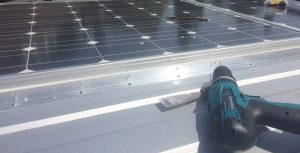Solar Charge Controllers: Introduction
A solar panel’s output voltage can vary widely, however the voltage applied to a lead acid battery must fall within a relatively narrow range. Consequently, a solar charge controller is needed to regulate the voltage provided by the panel.
As with many things in life, there is a large choice of equipment to choose from and of course not all solar charge controllers are created equal. Indeed, the choice of charge controller can have a significant impact on the overall efficiency of the system!
Solar Charge Controllers: PWM & MPPT
There are many cheaper charge controllers available for around £10. At this price these are mostly PWM, or Pulse Width Modulation controllers. These work by rapidly switching the power on and off to give the desired ‘average’ output required to charge the battery. They are great as an entry into solar power and are perfect for people on a tight budget. Indeed, I have used one for a number of years to keep an unused leisure battery topped up.
For a little more money a MPPT controller is a worthwhile investment, especially when considering all the effort of installing solar panels!
Photovoltaic cells (solar panels), operate most efficiently at a specific voltage, however this voltage will vary depending on the amount of sunlight falling upon the panel. A MPPT, or Maximum Power Point Tracking charge controller contains a small microprocessor which constantly adjusts the load on the panel. Consequently, the MPPT controller is able to ensure that the photovoltaic panel is operating near its ‘maximum power point’, leading to a greater efficiency.
Product Reviews
I have experience of three solar charge controllers, Firstly, a simple entry level unit which is ideal for keeping a leisure battery topped up when not in use. Secondly the EPEver Tracer 3210A, a sophisticated MPPT controller capable of delivering up to 30A to a battery bank. Thirdly, the Ring RSCDC30 MPPT controller which also acts as a DC-DC charger for vehicles with a smart alternator.
Before purchasing these controllers, I did a lot of research and deemed that these were the most appropriate for my scenario. I explain my reasoning in each review! For my review of these chargers, please click on the links!
Ring RSCDC30 MPPT Solar charge controller incorporating DC-DC charger
EPEver 3210A MPPT solar charge controller
For further information on my Motorhome conversion, please click here!
For further information on my Boat refurbishment, please click here!
Copyright. © 2020 Van and boat. All rights reserved.

